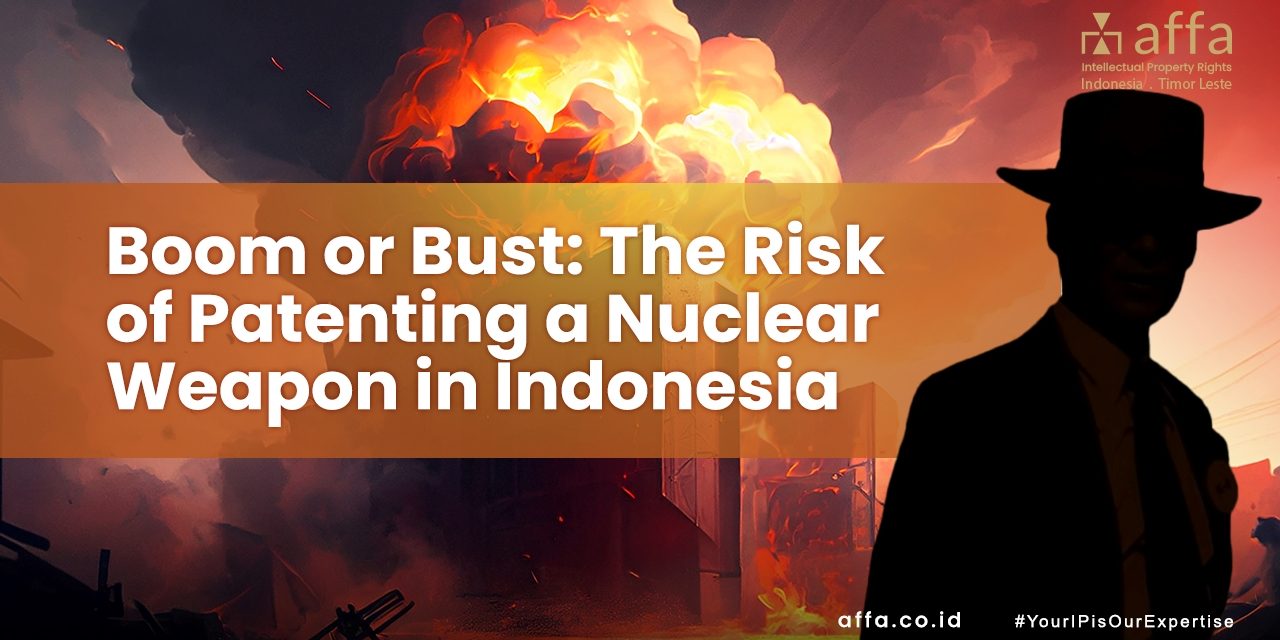Oppenheimer, a Christopher Nolan film, has been screened in Indonesia since July 19, 2023. IP practitioners, especially patent observers, must take advantage of this film. Apart from being studded with stars, starting from Cillian Murphy, Emily Blunt, Matt Damon, and Kenneth Branagh to Robert Downey Jr., this film raises the ethical side of an invention that shook the world.
As the title suggests, this film exposed Julius Robert Oppenheimer‘s life as the Scientific Director of the Manhattan Project, which developed the first atomic bombs in the United States. After the success of the bomb ending World War II, Oppenheimer became a vocal critic of nuclear weapons. He saw firsthand the destructive power of these weapons and came to believe that they posed a severe threat to humanity. He also thought the patent system was inappropriate for controlling nuclear weapons and was known for not pursuing patents for his inventions. But for that vision, he was ostracized by the US government.
A new change came a few years later through the Atomic Energy Act of 1954, specifically Section 218. This act, also known as the Price-Anderson Act, was enacted in response to the development of nuclear energy and the need to regulate its use in the United States.
Section 218 of the US Atomic Energy Act states that no patent may be granted for any invention or discovery that is useful solely in utilizing unique nuclear material or atomic energy in an atomic weapon. Any invention or discovery specifically intended for creating or enhancing atomic bombs or other nuclear weapons cannot be granted a patent under this law.
The prohibition on patents for atomic weapons is part of the broader regulatory framework aimed at controlling and safeguarding nuclear technology and materials to prevent their misuse and proliferation. The law aims to ensure that nuclear technology is used for peaceful and controlled purposes, such as energy production and medical applications, rather than for weapons of mass destruction.
The Indonesian Context
In Indonesia, if a Patent application is related to nuclear (weapons), then it is related to the interests of state defense and security as regulated in Article 50 of Law Number 13 of 2016 on Patents:
Article 50
(1) If an Invention relates to the interests of state defense and security, the Minister determines that the Application for the Invention is kept private after consulting with the agency administering government affairs in the state defense and security field.
(2) The Minister shall let the Applicant or his Proxy know in writing about the determination of the unannounced Application as referred to in section (1).
(3) Unannounced application documents consulted with government agencies, as referred to in section (1), are exempt from the provisions as referred to in Article 45 section (1).
(4) Government agencies, as referred to in section (1), must maintain the confidentiality of the Invention and Application documents consulted.
Thus, it can be concluded that the. Patents related to national security and defense (for example, nuclear weapons) can be protected. It is just that some provisions still prevent these applications from being published to the public in the publication stage for six months due to susceptible and sensitive information that should not be known by the public.
In addition, if the Patents are related to weapons, then by law the government can only implement them based on national defense and security considerations. This is regulated in Article 109 of the Patent Law. The implementation itself must be non-commercial and for domestic protection needs only. Article 110 of the Patent Law itself further explains the types of inventions that are “vulnerable” to the use of patents by the government unilaterally, including:
- firearms;
- ammo;
- military explosives;
- interception;
- tapping;
- reconnaissance;
- encryption devices and cipher analysis devices; and/or
- other state defense and security processes and/or equipment.
In Indonesia alone, there are around 139 patents related to nuclear technology that have been filed so far. However, this request is not directly related to nuclear weapons technology. Based on an accessible patent database, 51 applications were filed by applicants from Russia, 30 from the United States, and 23 from Indonesia.
Should you have any questions about Patent Protection in Indonesia or abroad, please contact us at [email protected].
Source:







